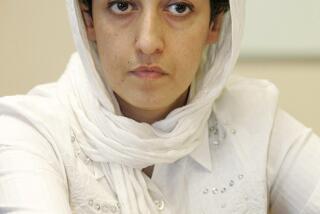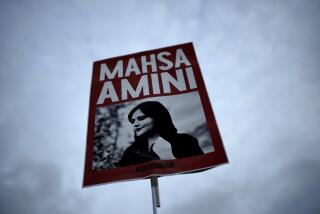Jailed journalist says Egypt to blame if hunger strike kills him
- Share via
Reporting from Cairo — Thin and frail, detained Al Jazeera journalist Abdullah El-Shamy said in a jailhouse video posted Thursday that he holds Egyptian authorities responsible if he dies as a result of a hunger strike.
The footage, which appeared on the website of the Qatar-based broadcaster, showed El-Shamy in a white prison uniform, appearing weak and listless. Associates said he had lost one-third of his body weight.
Separately, three journalists for Al Jazeera English, who have been held since Dec. 29, appeared in court Thursday on terrorism-related charges. The case was adjourned until May 22.
El-Shamy, who works for the broadcaster’s Arabic service, was jailed during Egyptian security forces’ forcible dispersal in mid-August of a sit-in by supporters of ousted Islamist President Mohamed Morsi. Accused of joining a terrorist group and assaulting security forces, he has remained in custody for nine months without facing any formal charges.
In the video, El-Shamy said that he was entering the 106th day of his hunger strike. He said he had received no medical care, despite official requests. “I hold the Egyptian prosecution and judiciary responsible if my health deteriorates, or anything happens to my safety,” the 26-year-old journalist said.
On Wednesday, Egyptian human rights organizations called on the Interior Ministry to reveal El-Shamy’s whereabouts. According to the video statement, he was moved to Cairo’s Torah prison in December. The video was apparently made there -- precisely when is not clear -- before he was transferred to an undisclosed location earlier this week.
Neither his family nor his lawyer has been able to trace him since.
In separate proceedings against the trio from Al Jazeera English, Australian correspondent Peter Greste, Egyptian-Canadian producer Mohamed Fadel Fahmy and Egyptian producer Baher Mohamed are accused of spreading false news and joining or supporting the Muslim Brotherhood, which has been declared a terrorist organization by the Egyptian government.
At Thursday’s hearing, defendants’ lawyers were blocked from obtaining copies of the prosecutors’ evidence until paying an exorbitant cost for copying five DVDs --estimated by the prosecutor at $170,000. The defendants’ lawyers argued that the actual cost of the copies does not exceed $8.
Human rights groups have repeatedly criticized Egyptian authorities for the journalists’ arrests.
“Egyptian authorities should be addressing the serious problems that journalists report,” said Joe Stork, deputy Middle East and North Africa director at Human Rights Watch.
“Instead, they are trying to silence the messenger, jailing journalists on the basis of laws that violate basic freedoms.”
Qatar-owned Al Jazeera has been a particular target of Egyptian authorities since Morsi was deposed in July and supplanted by a military-backed interim government. Qatar called for Morsi’s reinstatement, and Egypt says the emirate has sheltered fugitive members of the Brotherhood.
Hassan is a special correspondent.
More to Read
Sign up for Essential California
The most important California stories and recommendations in your inbox every morning.
You may occasionally receive promotional content from the Los Angeles Times.













